JULIAN TENISON WOODS
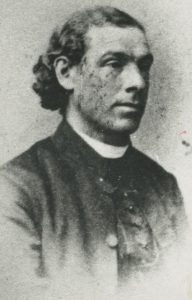
‘…thank God so peaceful, so unruffled a period of my life [in South Australia] that I look back on it as a kind of vacation which I have spent here in the bush’
– Julian Tenison Woods, 1866
Father Julian Edmund Tenison Woods co-founded the Sisters of Saint Joseph of the Sacred Heart with Mary MacKillop, Australia’s first saint. Woods’ life combined faith and science and today he could be viewed as a role model in both prayer and sustainability.
Between 1857 and 1867, Woods spent ten years living and working as a priest in Penola and the surrounding South Australian countryside. During this period, Woods was devoted to his work as a missionary priest, pursued scientific endeavours, and became an advocate of Catholic education for the poor. It was during this time in Penola that Woods met Mary MacKillop and together they established the Sisters of Saint Joseph of the Sacred Heart.
JOURNEY TO PRIESTHOOD & PENOLA
‘Cultivate… prayer, meditation. Keep hold of this, no matter what else you neglect’ – Julian Tenison Woods, 1864
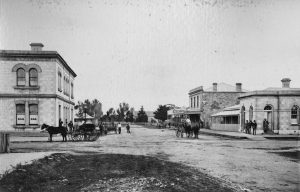
Julian Tenison Woods was born on the 15th of November 1832 in London, England, to Henrietta Marie St. Eloy Tenison and James Dominick Woods.
At the age of 18, Woods entered the Passionist Novitiate in Cotswold, England. Two years later, he continued his theological studies at the Marist Novitiate in Toulon, France. Woods returned to London in 1854 due to the Crimean War and an outbreak of cholera. Upon his return, Woods met Bishop Willson of Van Diemen’s Land and accepted the possition of lay assistant to the chaplain of goverment prisons in Australia.
Woods arrived in Hobart in January 1855 at the age of 22. When his role in the convict system became redundant, Woods moved to Sevenhills where he continued his studies for the diocesan priesthood with the Jesuits. On the 4th of January 1857, Woods was ordained at St Patrick’s Church in Adelaide. Two months later, Woods boarded the ship Boomerang bound for Robe, then travelled overland to Penola, arriving on the 19th of March 1857 to establish a permanent Catholic mission.
SOUTH AUSTRALIA
‘Nothing makes us feel as charitable towards another as praying for them’ – Julian Tenison Woods, 1864
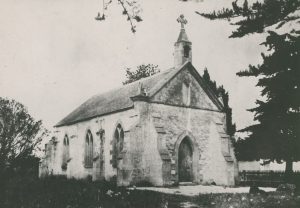
Julian Tenison Woods’ parish stretched 56,000 square kilometres and included the towns of Penola, Robe, Mount Gambier, Portland and the surrounding countryside. Woods travelled great distances on horseback to visit those in his parish, varying the route he took to include each town and livestock station.
On these long journeys, Woods would often suffer from hunger and fatigue but was supported by kind friends and strangers with whom he crossed paths; ‘one had to be entirely dependant on the hospitality of the settlers and they always made me feel part of the family’ – Julian Tenison Woods, 1866.
Woods sought to improve the lives of those within his parish and he would minister the sacraments on his journeys. Woods was also greatly concerned for the welfare of First Nations people, publicly denouncing their poor working and living conditions. During his time in South Australia, Woods encouraged the development of a public library in Penola, oversaw the establishement of churches within larger towns and petitioned for an improved system of roads.
SCIENCE & ECO-SPIRITUALITY
‘When out in the far Bush, in the prosecution of my duties, it has been the most delightful employment… to study the great unpublished works of nature’- Julian Tenison Woods, 1862
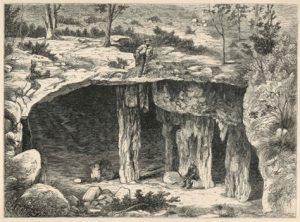
Eco-spirituality was a prevelant feature in Julian Tenison Woods’ life, beginning in Penola where he would combine his passion for scientific enquiry and devotion to Catholicism. Woods’ frequent jouneys on horseback across the vast South Australian countryside enabled him to pursue scientific observations in the area. He explored natural formations, gathered fossils, and participated in archaeological excavations.
This period culminated in the publication of Woods’ book, Geological observations in Australia: principally in the distric of south-east Adelaide, in 1862. He wrote in the book, ‘there is no country more interesting in its formations, more varied in its mineralogical productions, than South Australia…’
ADVOCATE FOR CATHOLIC EDUCATION
‘Try to think of God often through the day’ – Julian Tenison Woods, 1862
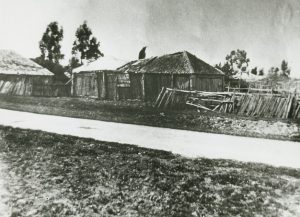
Julian Tenison Woods, inspired by the Sisters of Saint Joseph of Puy whom he met while in the district of Auvergne, France, dreamed of founding an Australian religious order. This was made possible with the assistance of Mary MacKillop, whom he met in 1861 whilst governess to her relations, the Cameron family of Penola Station.
The first step towards founding this order occured in 1866 when Woods, Mary MacKillop and her sister Lexie established a school inside a converted stable in Penola. The children were taught regardless of whether their parents could pay the tuition fee.
In late 1866, Woods was appointed Director General of Catholic Education, Chairman of the Board, and Inspector of Schools throughout the diocese by Bishop Shiel of Adelaide. With this new appointment, Woods left Penola in February 1867.
The order that Woods and Mary MacKillop founded, the Sisters of Saint Joseph of the Sacred Heart, would continue to support, facilitate and champion Catholic education throughout Australia to the present day.






